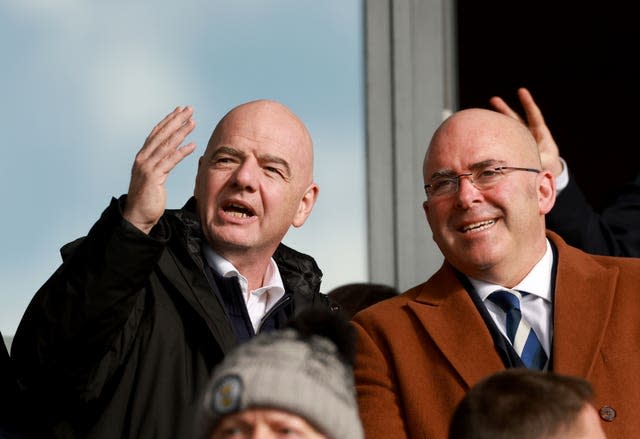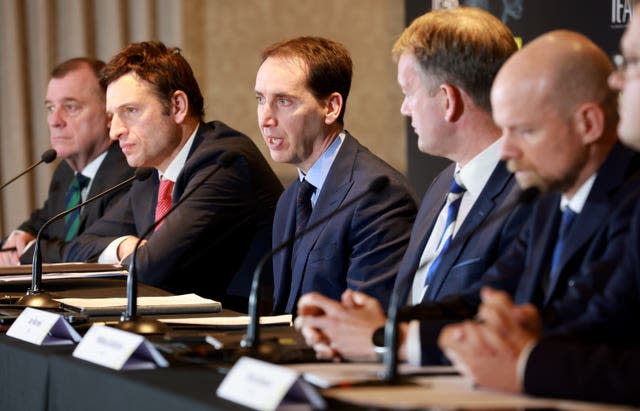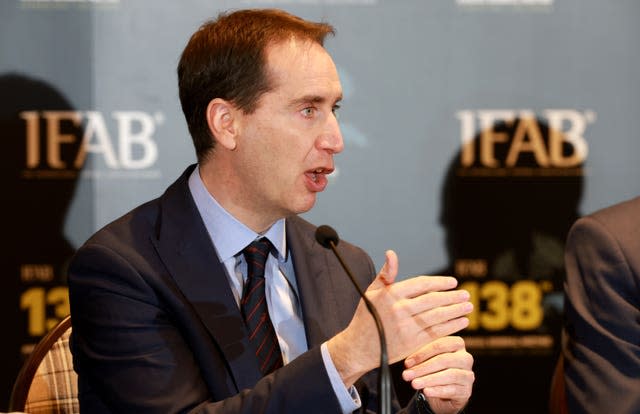IFAB plans to tackle time-wasting goalkeepers but sin bin trial not extended
Stronger enforcement on time-wasting goalkeepers was the major development to emerge from the annual meeting of football’s lawmakers as plans to extend sin bin trials to higher levels of the sport were quietly dropped.
Fans could be encouraged to join in countdowns on goalkeepers holding on to the ball too long in proposals approved by the International Football Association Board (IFAB) in Scotland on Saturday.
In competitions taking part in the trial, goalkeepers would be able to hold onto the ball for eight seconds instead of six and the sanction for holding on too long would be a corner or a throw-in in line with the penalty spot, rather than an indirect free-kick.
The plan was one of three trials approved for use in domestic competitions below the top two tiers, with the other two focusing on helping improve player behaviour towards match officials.
But the use of sin bins for dissent will remain at grassroots level for the time being.

FIFA president Gianni Infantino had already ruled out the use of blue cards for temporary dismissals on the eve of the meeting on the banks of Loch Lomond, and did not attend the media conference afterwards before the board headed off to watch St Mirren take on Aberdeen.
The PA news agency understands blue cards had been set to be part of a trial of sin bins at higher levels which were close to publication last month.
But they will not now be extended to higher levels – or to punish tactical fouls – any time soon despite FIFA referees committee chairman Pierluigi Collina claiming in November that discussions were under way about using them in “professional or even high professional football”.
The only developments were two refinements to the current grassroots trials, which will see sin bin yellow cards count towards a potential red card, and players having to wait for the next stoppage before their 10-minute period in the sin bin ends.

Scottish Football Association chief executive Ian Maxwell said: “The sin bin proposal definitely hasn’t gone further backwards.
“We’ve updated the protocol so we will assess how that works in that environment before we decide on what the next steps of those trials would be and if we start to take that further up the football pyramid.”
Football Association chief executive Mark Bullingham added: “If the trials at the lower levels work, of course the conversation continues throughout the pyramid.”
Bullingham admitted the news emerging in February had created a challenge as Premier League managers such as Tottenham’s Ange Postecoglou criticised the plans.

“I don’t think that was ever the intention for the trial to start in the Premier League,” he said.
Two trials linked to player behaviour which were approved were the ability for referees to create zones around themselves which only captains can enter, and for referees to order cooling-off periods where both teams would be required to retreat to their penalty areas.
Plans to tackle time-wasting will see a trial to increase the limit that a goalkeeper can hold on to the ball from six to eight seconds – but actually enforce it. It was recognised that referees are reluctant to give indirect free-kicks in the box, so the punishment could be a corner or a throw-in to the opposition instead.
Bullingham said: “The idea is, once the goalkeeper has got the ball under control, and the referee puts up his hand so that the (last) five seconds gets counted down, you’ll see the crowd respond to that and the other players will.”
The FA chief executive envisages some of the trials could take place in the lower levels of the English Football League or the National League.
“What level we will look at is an open discussion, I’m sure we’ll get that discussion with the relevant leagues,” he added.
The IFAB approves permanent concussion substitutes among several changes to the Laws of the Game
Follow the press conference on https://t.co/1mL2GscECK pic.twitter.com/PWXsdchyHU
— The IFAB (@TheIFAB) March 2, 2024
Other law changes include the option for competitions to introduce additional permanent concussion substitutions – something which has been trialled in the Premier League since the 2020-21 season. But calls from leagues and players’ unions for temporary subs to allow for head injury assessments were not taken up.
There were no discussions on extending the scope of VAR checks and the only nod to improving the communication between match officials and clubs and supporters over decisions was the move to extend FIFA’s trial where the referee publicly announces their decision and potentially their reasons.
The scheme was in place during last year’s Women’s World Cup and FIFA secretary general Mattias Grafstrom confirmed it will be further trialled at the Olympics this summer.
The committee did not discuss the prospect of broadcasting conversations between referees and video assistants live, or releasing audio on a regular basis.
Maxwell said: “VAR has not been in too long in Scotland and we are working through that process with the rest of football to try to increase that engagement and understanding.”


